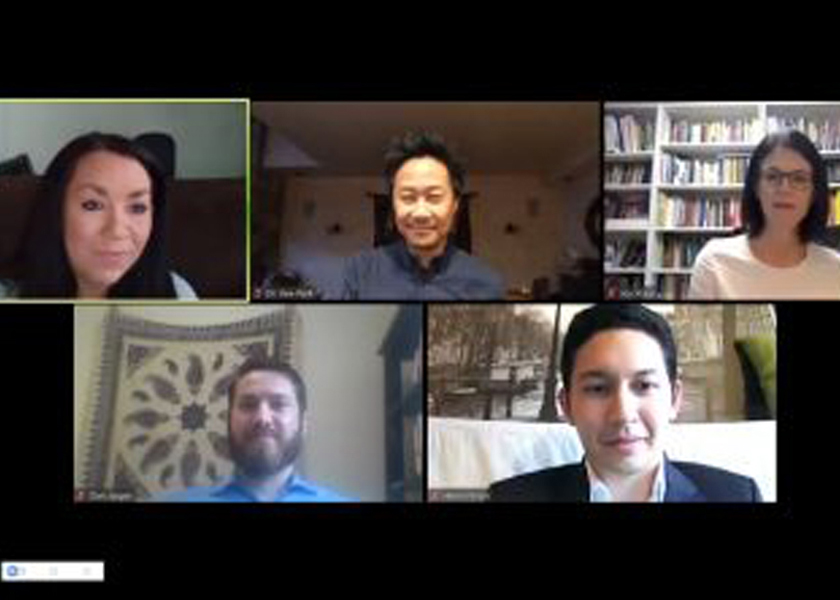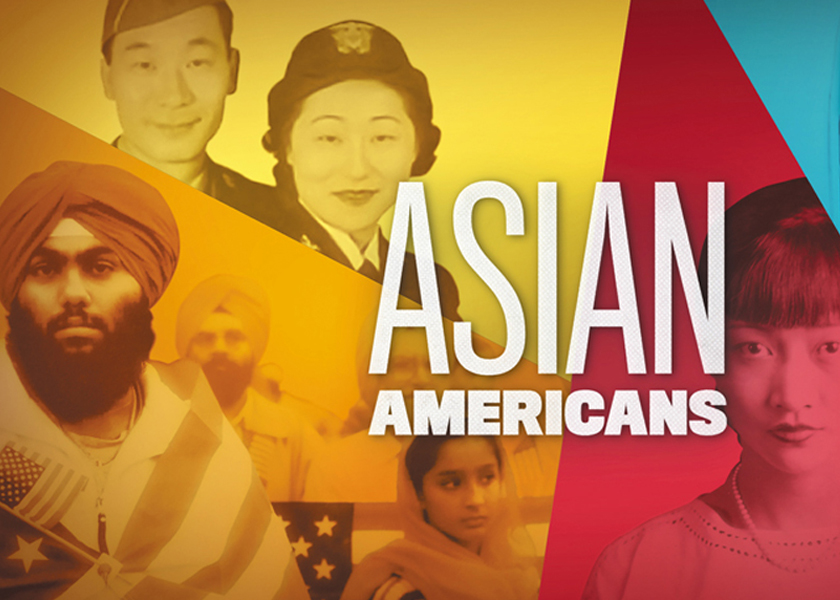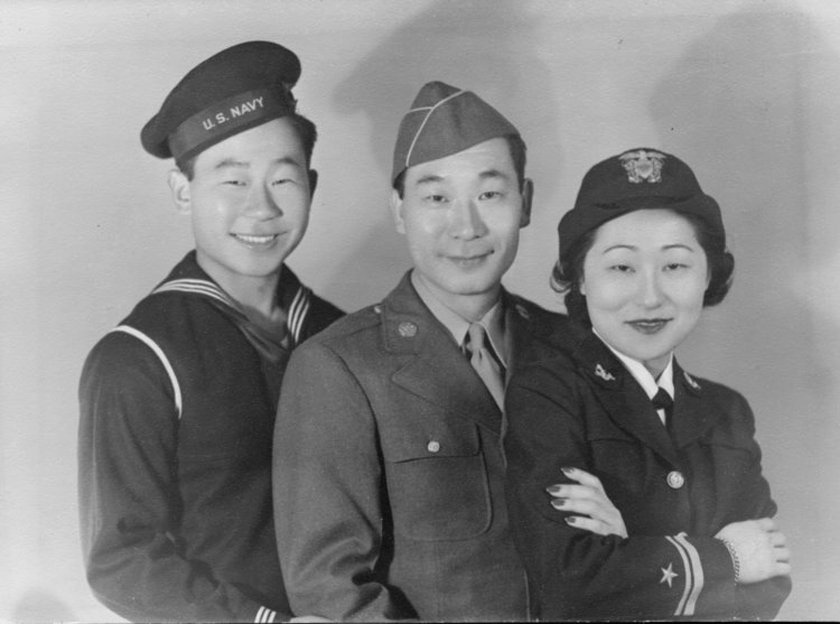Virtual briefing: Real crisis highlights need to reorient U.S. foreign policy toward peace outcomes | National News Feature by Martha Vickery (Spring 2020 issue)

The state of peace on the Korean peninsula in the environment of pandemic was the subject of a COVID: Sanctions and North Korea Virtual Hill Briefing held April 20. The forum featured an introduction by Rep. Ilhan Omar (D-MN) who has authored a bill to call for the review of sanctions and a reshaping of U.S.-North Korea policy. A policy analyst, a public health M.D., an aid professional working on food relief in North Korea, and a second aid professional working with disabled children in North Korea, rounded out the panel.
The briefing, sponsored by the advocacy organizations Korea Peace Now and Women Cross DMZ, included perspectives of aid organizations of the current “maximum pressure” campaign by the Trump administration that applied more stringent sanctions starting in 2017. Sanctions and complicated new rules for business operations have hampered aid work.
Omar has co-authored a package of seven bills aimed at reorienting U.S. foreign policy toward human rights, justice and peace, with military force as a last resort. The initiative is called Pathway to PEACE (Progressive, Equitable and Constructive Engagement). New sanctions have been applied over time in North Korea with little effect in terms of the direction of diplomacy, Omar said. “It hasn’t worked in Iran or Cuba, so it is really important for us to look at what a new approach would be like, and it needs to be a much more informed and thought-through process where we examine what impact these sanctions are going to have in many countries including, and especially in North Korea.”
Another bill Omar co-sponsored, HR 152, calls for an official end to the Korean War. “I believe no lasting solution is available until the war has been brought to a formal end,” she said.
Joy Yoon, who runs a pediatric rehabilitation organization Ignis Community, said the organization has been working in North Korea for 13 years. Their organization’s work in treating children with autism, cerebral palsy and other disabilities has shown North Koreans that many disabling conditions respond to treatment and patients’ lives can be improved, she said.
The organization was still moving ahead with permission to build a new hospital in 2016. But in 2017, the U.S. government issued travel restrictions, and their whole team were forced to leave the country. The special passport validations were halted for awhile, and since 2018 there has been a two to three month wait for them.
Through 2017, Yoon said, they were making progress to work with the government to establish pediatric rehabilitation services in all nine provinces. “That was only possible because we were living in North Korea,” Yoon added. “It is a misnomer that aid is a delivery of goods; it goes far beyond that to building relationships and trust with our North Korean counterparts, and it goes to bringing in our donors and our board members to see the work so that the support can continue to come in,” she said. Since 2017, many aid organizations have left the country due to the complicated travel restrictions and also sanction controls on banking transactions that make it difficult for aid organizations to access their money, she said.
Dan Jasper from American Friends Service Committee (AFSC) said his organization has been working in North Korea for 40 years. The organization modified its emphasis to food security in the ‘90s when famine was emerging in North Korea.
Jasper said that despite his organization’s transparency, it was subject to an investigation in 2017, which has had a chilling effect on the AFSC and other aid organizations. “This is the most difficult period we have worked under, which is due to U.S. regulations,” he said, adding that they are hoping for structural fixes in the system of sanctions, like those Rep. Omar outlined in her legislation.
Kee Park, an M.D. public health lecturer at Harvard Medical School, has also worked on the ground in North Korea as a surgeon. He now analyzes and writes about the effects of sanctions on the health of North Koreans.
According to Park, North Korea has been “pretty successful at keeping COVID-19 out of the country.” For the moment, they are not grappling with the pandemic, “but we know the virus will eventually enter North Korea; this is my prediction,” he said, which according to one projection could result in 150,000 deaths. Park said the medical system in the country is not set up for the kind of emergency care the pandemic requires —- he estimates that there are 50 ventilators in the whole country. If North Korea has to deal with an outbreak of COVID-19, “there is a huge gap in what they have compared to what they need to treat coronavirus patients.”
Right now, the government is building a “massive hospital in Pyongyang to increase its treatment capacity,” he said, and they are also opening a medical oxygen factory in North Hamhyung Province in direct response to the future need to treat respiratory problems associated with COVID-19, he said.
Park said the pandemic could be the chance for adversaries to lower their guard and try to cooperate with one another. “It could open up opportunities for diplomacy and hopefully peace,” he said.
Henri Feron, an analyst from the Center for International Policy, said negotiations ongoing in 2018 and 2019 have broken down. “North Korea has said it is not interested in talking any more unless it is about peace,” he said. As a result, North Korea refused COVID-19 aid, a relatively small amount compared to the disruption being caused by sanctions. “From a North Korean perspective, the sanctions are so comprehensive now that nobody can tell if they are about non-proliferation or if they are about regime change,” he said.
In terms of whether the COVID-19 pandemic presents any diplomatic opportunities, Feron said he that the UN Secretary General Antonio Guterres has called for a global cease-fire, and the High Commissioner for Human Rights Michelle Bachelet Jeria has called for sectoral sanctions (sanctions of whole classes of products, regardless of use) to be relieved for humanitarian reasons. “It’s a way of starting this conversation that is understandable for everybody, that’s politically relatable for everybody. So I think that’s the opportunity now.”
Right now, funding goes to preventing the next war, instead of to urgent causes now before us, Feron offered. According to research by the Congressional Research Service, a new Korean war could result in tens of millions dead. Hundreds of billions are spent by neighboring countries to prepare against a new war outbreak. “That’s a lot of potential dead people and a lot of money that could be used for something like pandemic prevention.”
Jasper commented that “the world is as vulnerable as the most vulnerable population out there, and to have a policy of isolation is dangerous” at the global health level, and for national security. The U.S. and North Korea have been engaged in a pointless dispute. “It’s a kind of a circular argument where they say ‘we’re not going to give you a peace treaty unless you give us your weapons’ and they’re saying ‘well we are not going to give you our weapons until we have a peace treaty,”
Jasper said he has been suggesting that it may be helpful instead to “build up a level of confidence” where a peace treaty begins to sound doable. “Kind of the low-hanging fruit in the humanitarian sphere,” he said, such as NGO assistance, North-South family reunions, repatriation of service member remains. “These are the small things that can build trust and get us to a place where we can start to reinvest that money” that is now used for protection from war, he said.
There is an additional bill that should get support, Park said, the Enhancing North Korean Humanitarian Assistance Act, sponsored by Sen. Ed Markey (D-MA) and Rep. Andy Levin (D-MI) which would expedite needed aid to non-governmental organizations in North Korea.
Feron said that, in thinking of the COVID-19 crisis as a natural disaster. “It puts in high relief how artificial and unnecessary the conflict with North Korea is.” As the U.S. tries to use a continuing war as leverage for things we will not achieve. “There should be a review of the artificiality of this war, especially when we are confronted with natural disasters such as COVID.”
Park said that the paradigm the U.S. has used, particularly the design of policies from a military perspective, must be examined anew. Denying aid, or tying it up so that it is effectively denied, risks lives. “Are we willing to accept the deaths of innocent people in the pursuit of U.S. national interests?” he asked, “ Because that’s exactly what is happening now. I would like to see fundamental structural changes in the way we think about human lives.”
Korean Quarterly is dedicated to producing quality non-profit independent journalism rooted in the Korean American community. Please support us by subscribing, donating, or making a purchase through our store.




